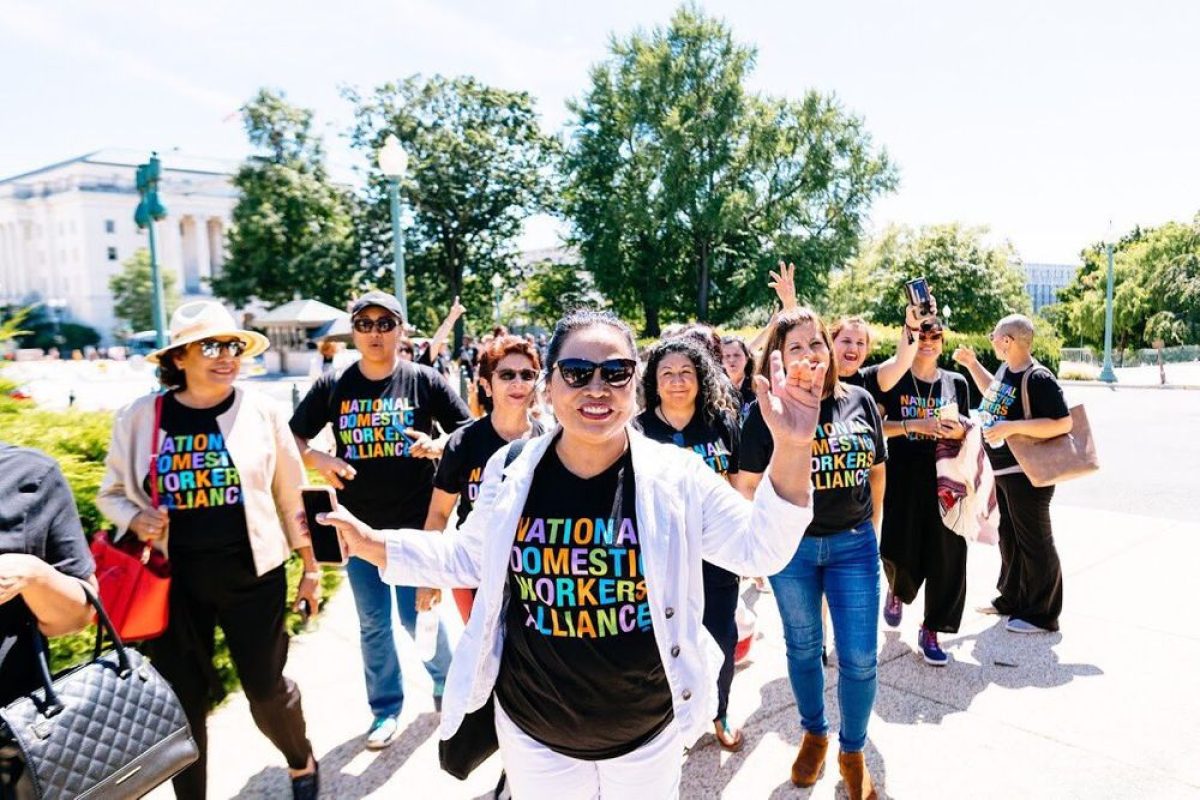National Domestic Workers Alliance was on Capital Hill this week to talk to legislators about the importance of our National Domestic Workers Bill of Rights. A Domestic Workers Bill of Rights Act. was proposed in the Congress by Senator Kamala Harris and Representative Pramila Jayapal.
“If it passes into law, the bill could codify the workplace protections and standards that women of color in the industry have spent years organizing around; Harris’s camp says the bill’s impact would reach 2.5 million domestic workers, including nannies, house cleaners, and home care workers.”Frida Garza for Jezebel, July 17, 2019
This is a historic issue in the United States, and an inequality for domestic workers and farm workers that was codified in the National Labor Relations Act of 1935, which gave private-sector employees the right to collectively organize, but specifically excluded domestic and agricultural workers from the definition of “employees.”
Domestic workers, for the reasons described in this need for a bill of rights, are vulnerable because their area of work is not regulated and has no guaranteed protections from exploitation. Out of 110, domestic workers interviewed,
- 85% of domestic worker trafficking survivors report having pay withheld or being paid well below minimum wage
- 81% have lived in abusive living conditions
- 80% have been tricked with false or otherwise deceptive contracts
- 78% have had employers threaten to report them for deportation if they complain
- 77% report having their movements restricted or monitored by their employers
- 75% experience isolation from the outside world, with employers cutting off access to communication
- 74% report having experienced emotional or verbal abuse by their employer
- 73% report working excessive overtime, more than 48 hours per week
- 66% report having experienced physical or sexual abuse, either by their employer or a family member of their employer
- 62% report having their passports or other ID taken away from them by employers
- 45% report being in fear of physical harm if they were to try to leave their employment situation
These are all forms of force, fraud, and coercion that constitute compulsory labor, or labor trafficking. To read more about that study, and the prevalence of human trafficking in domestic work, read the full Institute for Policy Studies Report at this link.
Much like our work with law enforcement – and every other movement in our nation – the shifts in legislation and enforcement of domestic worker rights has been happening state by state. As that state-led movement is gaining momentum, legislators pushing a federal bill has the potential to pass, granting these important labor rights to workers across the nation.
Domestic Workers’ Bills of Rights have been passed in eight states, with New York, Hawaii, and California leading the way. The first-ever Domestic Workers’ Bill of Rights passed in New York state in 2010. Seattle was the first and only city to pass the legislation, which went into effect at the start of the month. Rep. Jayapal, who represents Washington state and is the first Indian-American woman to serve in the U.S. House, supported the Seattle bill. “Local laws make a huge difference, but the reality is that what we really need is standards for the entire sector to be raised up, and that’s difficult unless you have a federal law,” Jayapal said in an interview with Refinery29.
Read the full Refinery29 piece for details on the legislation, the state and city based legislative wins, and the historic and future impacts of these policies.Tiffany Diane Tso for Refinery29 on July 15, 2019
To learn more, follow the National Domestic Worker’s Alliance (NDWA on Facebook and their CEO Ai Jen Poo on Twitter. Below is a video of Ai Jen Poo outside the US Capitol this week speaking on the legislation and NDWA’s mission.
Take Action
Read up on the bill at NDWA’s website and on their social platforms, and then call and email your Senators and Representatives asking them to support this important legislation. When all workers have protections and rights, we are closer to a more equitable society where we are all better off. #DignityForAllWorkers









